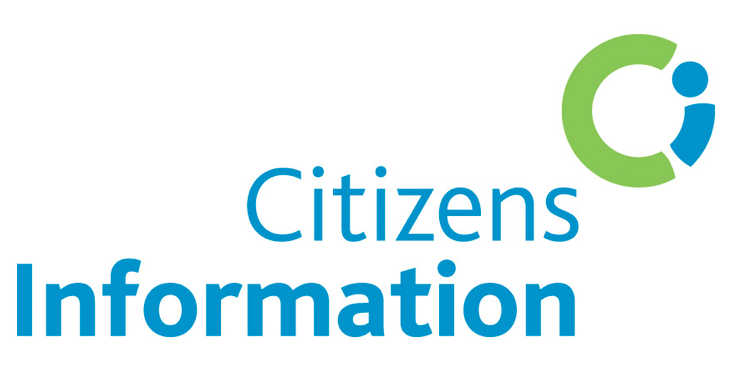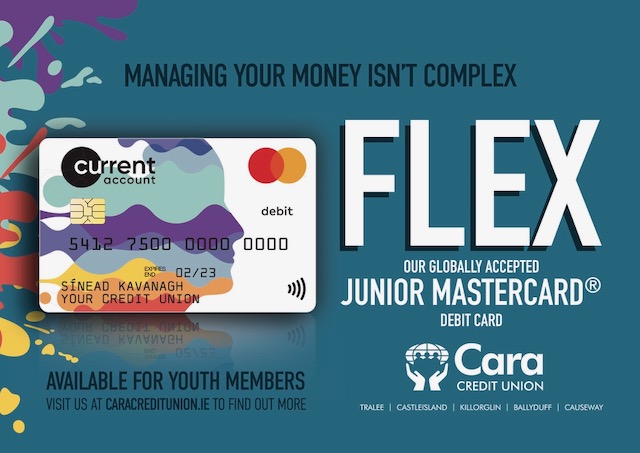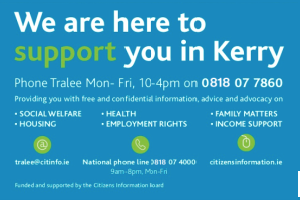 Know Your Rights has been compiled by Kerry Citizens Information Service which provides a free and confidential service to the public…
Know Your Rights has been compiled by Kerry Citizens Information Service which provides a free and confidential service to the public…
Many young people will be taking up summer jobs during the summer months so today Deirdre Vann Bourke, Kerry Development Manager with South Munster Citizens Information Service looks at some useful information in relation to the employment rights of young workers.
Firstly, Deirdre, what information and supports are available for workers from Citizens Information?
We provide information, advice and advocacy across a broad range of topics and one of those is employment, including young workers. If we don’t have the answers, we will refer you to someone who does.
Who are classed as ‘young workers’?
Young workers are people aged 14 to 18, who work for an employer. As they are generally in full-time education, they are protected by different employment laws than adults. This is to make sure their work does not put their health or education at risk.
Continued below…
The law also sets out different rules for young workers, depending on their age. Workers aged 14 and 15 are classed as ‘children’. Workers aged 16 and 17 are classed as ‘young persons’.
Do employers have to receive proof of age and written permission from parents?
Before young workers can get a job, they must show a copy of their birth certificate (or other proof of their age) to the employer.
If they are under 16, they need written permission from their parent or guardian. This permission letter must be given to the employer.
Are there any restrictions on employing 14 and 15 year-olds?
Yes there are. By law, children aged 14 and 15 cannot be employed in regular full-time jobs. However, they can:
• Do light work during the school holidays (they must have at least 21 days off work during this time)
• Take part in an approved work experience or educational programme (once the work is not harmful to their health, safety or development)
• Work in film, cultural, advertising or sport (under licences issued by the Minister for Enterprise, Trade and Employment)
• Outside school term time i.e. during school holidays, children aged 14 and 15 can work a maximum of 35 hours a week (or up to 40 hours if they are on approved work experience).
During school term time children aged 14 are not allowed work during school time, while children aged 15 can do 8 hours of light work a week.
Continued below…

.
Are there restrictions on employing 16 and 17 year-olds?
Young people aged 16 and 17 can work a maximum of 8 hours a day, up to 40 hours a week. If the young worker is under 18 and works for more than one employer, their combined daily or weekly hours cannot exceed the maximum number of hours allowed.
Young people aged 16 & 17 are only allowed to work between 6am and 10pm.
What are the rules in relation to rest breaks during the working day?
Children aged under 16 must have a half-hour rest break after 4 hours work and young people aged 16 & 17 must have a half hour rest break after 4.5 hours work. If you are aged under 16, you must have 14 consecutive hours off each day and 2 days off each week, while 16 & 17 year olds must have a daily break of 12 consecutive hours and 2 days off each week.
Can young people work in a licensed premises (such as a pub)?
A. Young people who are attending school can be employed on general duties in a licensed premises, such as a pub. It is important to note that general duties does not include selling alcohol at the bar or in an off-licence.
During school term, they can only work until 11pm on a day that is not immediately before a school day. For example, you can work until 11pm on Friday night if you are not in school on Saturday. However, you cannot work until 11pm on Sunday if you must be in school on Monday.
Employers who employ young people in a licensed premises must follow the Code of Practice concerning the Employment of Young Persons in Licensed Premises.
What is the minimum wage for young workers?
Since 1 January 2023, the national minimum wage is €11.30 per hour. However, not everyone is automatically entitled to get this. Workers under 18 are only guaranteed up to 70% of the national minimum wage, which is €7.91 per hour. Your employer can pay you more than the minimum wage if they want, but they are not required to by law.
Are young workers entitled to receive tips and gratuities?
If you work in a job where staff get tips and gratuities from customers (such as a restaurant or bar), you are not automatically entitled to get these tips. However, you are not required to give your tips to your employer either.
If all tips are collected by management and paid to staff through the payroll, then these tips are taxed in the normal way. Upcoming changes to the law on tips will give employees new legal rights in relation to both cash and card tips.
Employers will have to make sure tips are distributed to staff fairly, equally and in a transparent way. They will also have to display a notice explaining how tips are shared among staff. This has not come into effect yet.
Do these regulations apply to children or young people employed in their family business?
The working hours for young people are regulated by the Protection of Young Persons (Employment) Act 1996 and it sets maximum working hours, rest breaks from work and bans late night working for young people under 18. The Act does not apply to children or young people who are employed by a close relative.
As usual, this is a vast area and we do not have time to delve into all the details so if someone would like more information what should they do?
• If someone would like more information about any of the issues covered, it would be best to telephone or drop-in to your local CIC. Staff there will discuss your current circumstances with you and make you aware how the various schemes apply to your personal circumstances. The service is free and confidential.
If you need further information about any of the issues raised here or you have other questions, you can call a member of the local Citizens Information Service in Kerry.
……………………………………………………………………………………………………………………………………………………………………………………………………………………………………………………………………………………………………………………………………………………………………………………………………………………………………………………………………………………………………………………………………………………………………………………………………………………………………………………………………………………………………………………………………………………………………………………………………………………………………………………………………………………



















